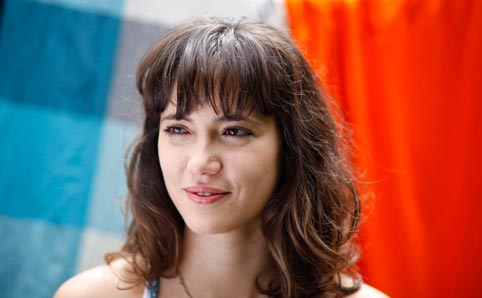
Over the last year or so, a wave of melancholy new Brazilian music has crashed onto São Paulo stages, leaving fans, critics and audiences awash with enthusiasm. The sound is both retro and contem- porary: classic MPB given a brush of modern rock angst. But while the main artists concerned – Bárbara Eugênia, Nina Becker, Tiê Gasparinette and Thiago Pethit – bathe in a critical glow, lauded for the intricacy of their melodies and the intensity of their lyrics, there’s one thing they don’t like. And that’s the name their style has been dubbed with: ‘fossa nova’ – which could be loosely translated as ‘bossa nova on a downer’.
Bossa nova is celebrated as one of Brazil’s most delicate musical forms, and internationally speaking, it’s perhaps the most famous Brazilian style of all. A lilting, jazzy, romantic sound, made famous by languid, timeless tracks like ‘The Girl From Ipanema’, and produced by a loosely connected group of young com- poser/musicians like Tom Jobim, João Gilberto and Nara Leão, it encapsulated the optimism, the romance, the sunshine and the sadness of late-1950s and early 1960s Rio, and spread around the world.
Big city beat
Fossa nova, on the other hand, is more about São Paulo than Rio – more urban than bucolic. Its creators are as influenced by modern rock as they are by the bossa nova greats. And perhaps the only thing they have in common, apart from the melancholy air of much of their work and their rising stars, is that they don’t want to be lumped together, under any label, fossa or other.
‘I don’t agree with the term,’ says singer-songwriter Bárbara Eugênia, 30. ‘The band I like most is Radiohead.’ Which isn’t to say that her sound doesn’t have echoes of bossa nova – but it has a lot else as well. Her debut album, Jornal de BAD, released last year, mixes elements of blues, rock and jazz with her quietly emotional vocal style. ‘I make music without knowing how it’s going to turn out. Some songs are blue, others have psychedelic influences,’ she says. Born and raised in Rio, it wasn’t until Eugênia moved to São Paulo in 2005 that her career really took off. ‘I came to São Paulo to work,’ she explains. ‘It really worked out.’ Her album flits from rockier numbers like ‘A Chave’, with its honky tonk piano, to the gentler ‘Por Aí’ – a track that might easily be described as contemporary bossa nova, as indeed might her romantic lyrical themes. ‘All my songs are about love – good love, bad love,’ she says. ‘But there’s always something a little depressed.’ Life, says Eugênia, is a balance. ‘It’s a mixture. It’s got its comedies and its tragedies, and its tragic-comedies as well.'
Berlim, Texas?
Thiago Pethit’s album Berlim, Texas, was one of 2010’s critical hits. ‘I call it “universal contemporary pop ,’ says the 28-year-old singer, of his sound. ‘You can’t say I make folk, or MPB, because MPB has very specific roots. Today, everybody makes contemporary pop.’
The paulistano has been hailed as the ‘Brazilian Serge Gainsbourg’ – and not just because he sometimes sings in French. His theatrical repertoire is part smouldering Brazilian blues, part cabaret. But aside from this former actor’s showman style, his sound also has something of bossa nova’s wistful melancholy. ‘It reflects who I am. I’m a little melancholic, a little nostalgic,’ Pethit explains. ‘As if I’m missing something that never happened.’ But Pethit isn’t scared to twist things: on ‘Não Se Vá’ his quietly expressive voice is matched with piano and cello but marches to a vaudeville finish. The cinematic ‘Fuga No.1’ has a whirling accordion and a sombre cavaquinho, but the atmosphere is more Parisian than paulistano. It’s his vocal style that owes most to bossa nova, he notes. ‘I’m really influenced by João Gilberto,’ he says. ‘I always sing quietly, with short phrases.’
Like many of the bossa nova generation, the fossa nova musicians come from middle-class families. Pethit’s mother is a psychiatrist and his father records voiceovers for adverts; Eugênia’s dad is a translator and her mum reads tarot cards.
Don't call it 'fossa'
Singer-songwriter Nina Becker, 36, whose mother is a university professor and whose father is an orchestra conductor, also grew up in Rio. She was a deeply shy teenager, she says: ‘I was scared of getting on stage. I was scared to ask people the time in the street. My mum was worried, and she made me take theatre lessons.’ Her shyness has been overcome: she took part in a fashion show at the 2007 Rio Fashion Week.
She, too, is negative about the F word: fossa nova. ‘It’s got nothing to do with what we’re doing. I don’t identify with the term.’ Instead, she sees herself as a songwriter. ‘It’s a type of music that has a lot to do with the song, the culture of the song in Brazilian popular music,’ she says. ‘I like to make songs with melody, songs to remember.’
Her sound, as evidenced on the track ‘Tic Toc’ from her second album, Vermelho, has a tropical sway, pop melodies, and the gentle guitars of acoustic rock, plus a splash of Rio sunshine. Her first album, Azul, has a lot of jazzy, unobtrusive chords and quietly sad vocals – as evidenced by the track ‘Não Tema’. ‘Bossa nova was one of my influences. Everything that I learned about harmony, all the chords I learnt to play as an adolescent,’ she says. ‘I write with the voice of a woman. But it could be a really feminine song about day-to-day life with a sad atmosphere, or a song about beach, love, and sun.’
Paulistana Tiê Gasparinette, 30, creates songs that are ‘intimate, true, without make-up,’ she says. ‘I try to make them as raw as possible. To write from the heart.’ With her clear, calm voice drenched in quiet emotion, acoustic guitars a-strumming and a gently surging cello, her song ‘Assinado Eu’ is powerfully romantic without being sentimental. Influenced by Leonard Cohen, Gasparinette – best known as simply Tiê – calls her style ‘MPB folk’. ‘I like to talk about day-to-day life, about relationships, about stories,’ she says.
But while her sound is gentle, it swirls with intensity. ‘Love, because that’s what I call you,’ she sings on ‘Quinto Andar’, ‘I know for sure you don’t remember me.’ Love, Tiê believes, is important. But it’s not everything. ‘I don’t think it resolves life, but it helps a lot.’
Away from the microphone, she is ‘very light’, she claims, and writes about real relationships – her own and those of her friends. ‘Everybody who knows me knows who I’m singing about,’ she laughs. Life, to Tiê, is for laughing at. ‘Between comedy and tragedy, it’s a comedy, for sure,’ she laughs. Her song ‘Na Veranda Da Liz’, with its loping rock beat, sweeping strings and cascades of chorus, is simply a great pop song – which if it wasn’t sung in Portuguese could just as easily be European or American. Perhaps Pethit’s ‘universal contemporary pop’ category works better after all.
Enough of longing
But the phrase fossa nova has stuck, and for one good reason. Ruy Castro’s definite history of bossa nova is called Chega de Saudade – enough of longing. His book is well-named: the sense of delicious longing, of melancholy, of longing conjured up by the untranslatable Portuguese word saudade is intrinsic to bossa nova.
And if the new guard of musicians has anything in common with the romantic stars of Rio’s past, it’s that same sense of wistful, exquisite longing. Fossa nova is too gimmicky a tag for musicians who take their art as seriously as this. But we haven’t seen the end of saudades yet. ‘Not every day is beautiful and blue,’ concludes Eugênia. ‘Life is made up of many things. A little bit of melancholy is good.’



